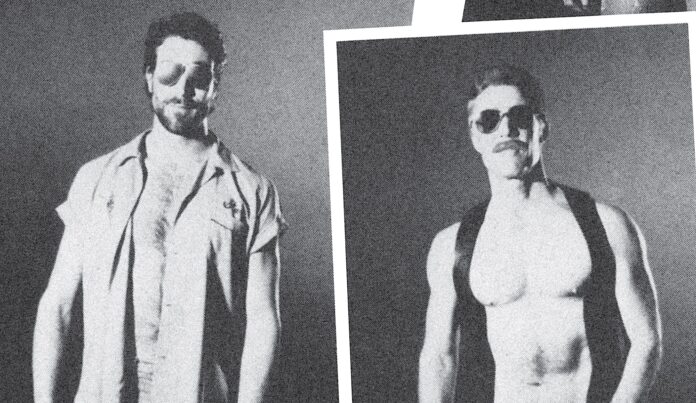It was two minutes before our scheduled interview, and I was racing around my apartment with my hands gesticulating wildly, screaming “where is it where is it where is it!!” in a voice that rose like a tea kettle. Not exactly butch behavior, darling. In fact, I’m still shocked the overstuffed furniture I swished past didn’t burst forthwith into flames. The joint was getting minced.
I was looking for the copy of The Butch Manual that I had snagged a couple weeks ago at the Dark Entries Records booth at the SF Art Book Fair. Always a fan of kicky gay ephemera, Dark Entries honcho Josh Cheon is republishing the long-lost 1982 classic, bringing it back to life in a facsimile edition via queer historians and bons vivants Brendan McHugh (who provides a forward) and John Dempsey.
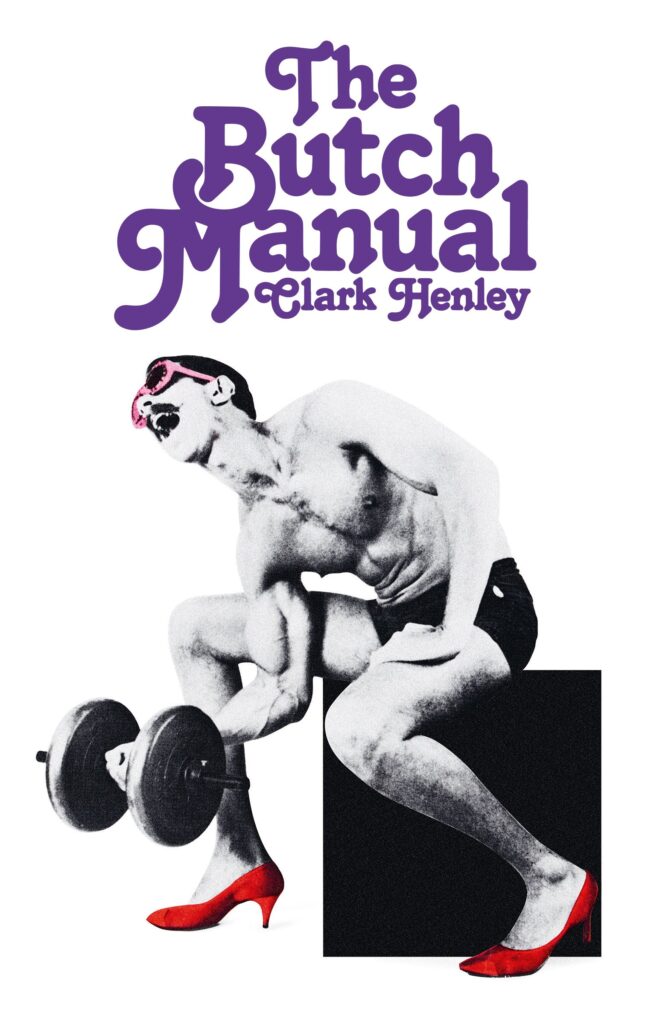
Situated somewhere between 1977’s The Joy of Gay Sex and 1984’s Yuppie Handbook, with a tip of the biker cap back to 1972’s The Leatherman’s Handbook (RIP author Larry Townsend), Clark Henley’s acerbically witty satire of the masculinity-fixated gay clone scene sends up a dominant monoculture while lovingly detailing and preserving it. Often uproarious and surprisingly poetic, The Butch Manual is full of firmly tongue-in-cheek quizzes, listicles, self-modeled photo-illustrations, flights of fantasy, wild rants, and detailed charts (the Dexedrine-addled “Weekend Erection Possibility Chart” is a favorite) that promises to “educate wannabe Butches on how to walk, talk, stand (or lean), dress, and even what drugs to take to avoid the freak-out zone.”
The book’s republication also celebrates ambitious San Francisco writer and voracious journaler Henley himself—a prodigious talent who, like contemporaneous musician Patrick Cowley, was deeply embedded in the city’s sexual milieu—whose story was infuriatingly cut short when he died of AIDS in 1988. His semiotic-linguistic-sociological swipe at butch rigidity presages our own post-critical gender theory moment (it’s Judith Butler’s world, we’re all just gesturing performatively in it) while leaving a prescient warning against the literal drag of conformity, in a community that supposedly celebrates diversity.
I spoke with McHugh and Dempsey on the eve of the book’s West Coast launch event (7pm, Green Apple Books on the Park at 9th Avenue, SF, also live-streamed, RSVP at link, proceeds go to The Trevor Project) which will feature local poets and luminaries reading from The Butch Manual—including Eric Sneathen, Zoe Williams, and Julian Carter—as well as several of Henley’s family members.
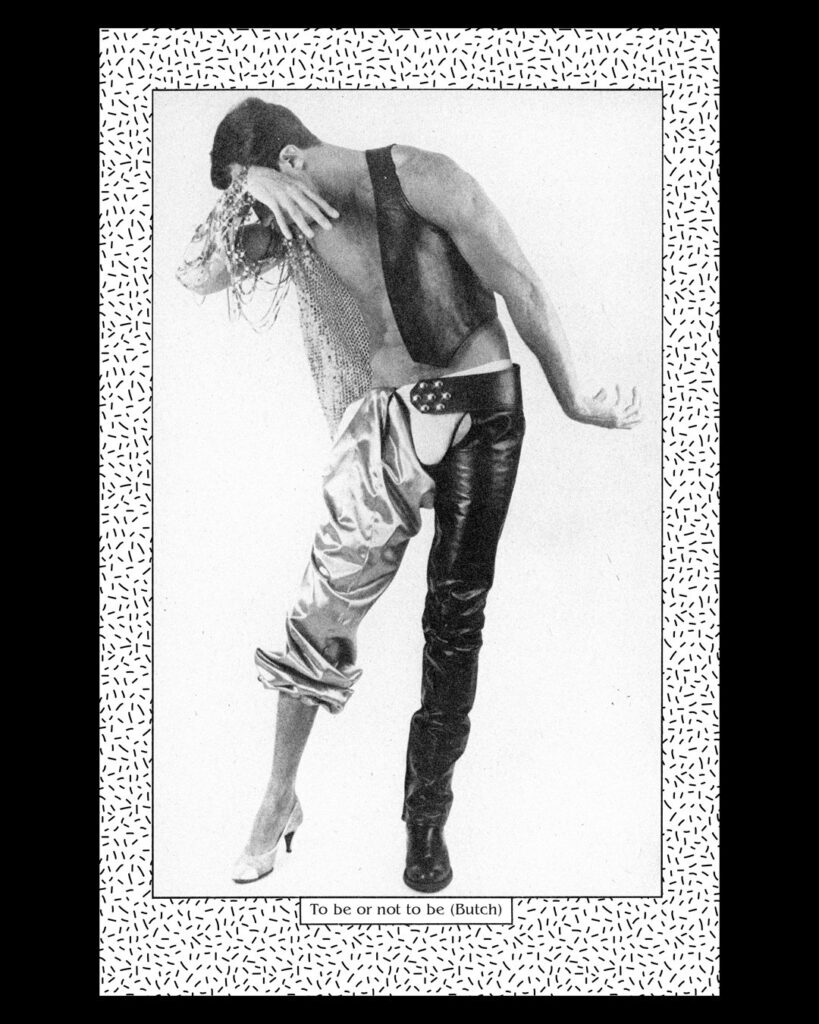
48 HILLS You’re both from a very different time than The Butch Manual delineates. How did you discover the book?
BRENDAN MCHUGH For me, I came to the book because I was writing about Clark Henley’s work around AIDS. He was writing for the Shanti Project‘s people with AIDS-specific newsletters, as well as a newsletter he had started with friends who were also Shanti clients. These newsletters also had some of his art, and I was like, who is this guy? The writing is so compelling, and very funny, and also deeply sad. So I read his obituary, and it said he had written The Butch Manual, which came out before he was diagnosed. I could not afford to buy a hard copy, which was going for hundreds of dollars, sometimes a thousand dollars.
So I did what I think a lot of people do, and I found this one very specific, illegal PDF copy online. I wrote that article [about AIDS publications] in 2021, and finally read The Butch Manual in 2022. It immediately drew me in, There were like two jokes per line, but also this incredible teetering between satire and dead seriousness. I knew it was something special that needed to get out in the world, partly because Clark’s own story itself was so fascinating, and this thing was just so funny and kind of moving.
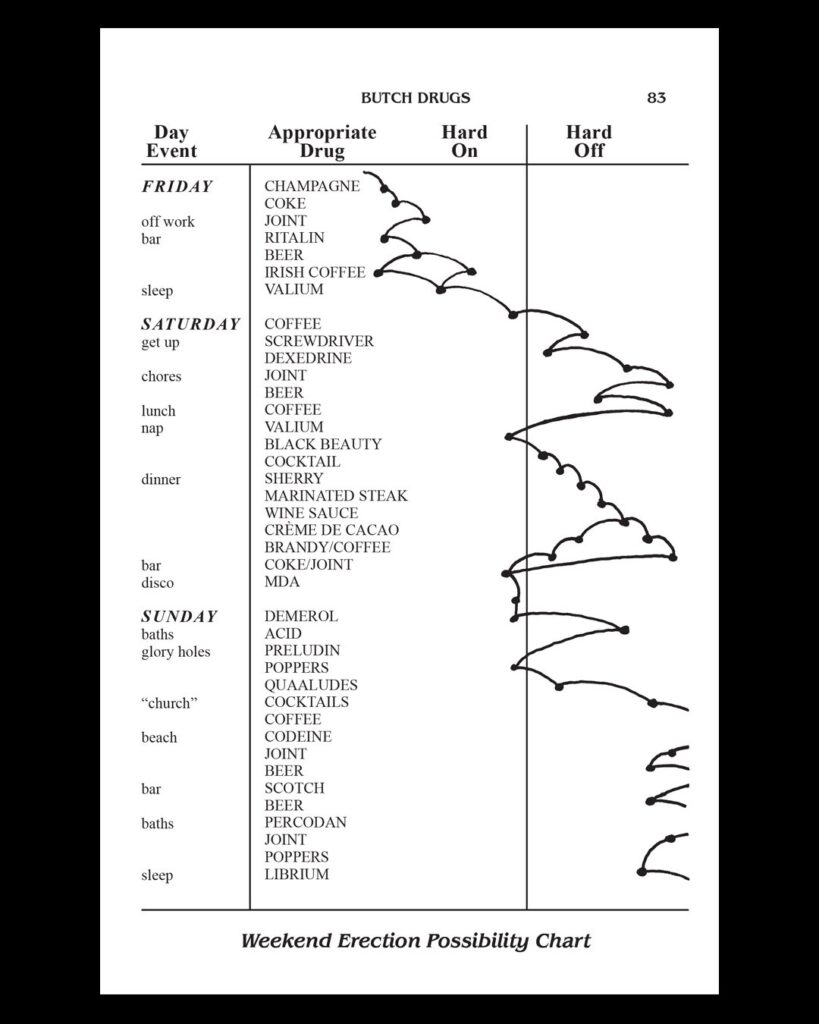
JOHN DEMPSEY I’m actually out in Fire Island right now. I bought a house here about 10 years ago, and it’s filled with like treasures like old books and opera CDs and signed photos of Bette Davis, so much stuff from the previous owners. The houses here come mostly fully furnished because it’s such a pain in the butt to cart things off the island, so there’s tons of history preserved here. The original Butch Manual was tucked in a bookshelf, and it became this object of fascination, people could just not believe something like this existed. It’s the center of a little shrine in our kitchen, and everyone who comes over the house picks it up and start reading it and giggling and like, ‘Oh my God! The drug chart!’
One year some friends were throwing a party. I think it was like an old dating app or something they were trying to launch out here, and they said, ‘Can you help us do something thematically for this party?’ So we thought, let’s do it around Butch—the book and the whole concept. My friends and I rewrote some of the gags and made big signs from some of the book’s quotes. It really caught on, we got DJs to come in from the city, really did it up, and for the past four years the Butch party has become kind of its own brand out here.
Then I became obsessed with trying to find the family and track the book materials down because I was like, this thing has to be republished. I found the same PDF we’re referring to, and I made my own illegal rendition that I reprinted and passed around the island. I went online to find more information, and ran into Brendan’s writing around Shanti. I wrote him immediately and within like 10 minutes he wrote me back. It was like fate, it was like I found my Butch Manual soulmate. Brendan said he had contacted the family and they were open to republishing the book. And then Josh really supported the project, and it just really all came together in a spectacular way.
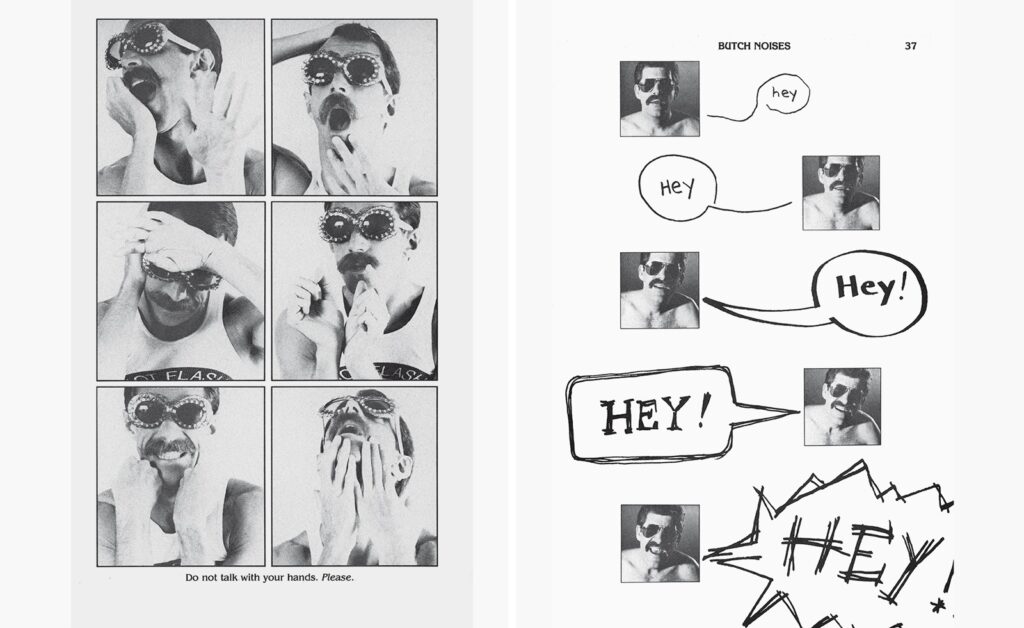
48 HILLS One of the things I love about the book is that it critiques a scene that even now many hold sacred, even if the timing was terribly unfortunate, as we were about to pretty much lose it all. What are some of the things that jumped out at you from across the decades since Clark had written the book?
JOHN DEMPSEY I think my favorite part is his photo of the Butch refrigerator, because it’s just like my refrigerator: just a bottle of poppers in the freezer and a jar of white stuff on the door. [laughs]
I really love that there’s so much energy in the book. A lot of it is from the journals he kept which were just full of so much riffing—riffing, riffing, riffing. A lot ended up on the book’s cutting room floor. It feels like he basically invented the listicle. He would just take a thing and approach it from every angle he could, turning it around and around in that gay mind of his. I keep finding new little jokes every time I read it.
BRENDAN MCHUGH I love how creative it is in the layout. The layout is based on the Boy Scouts of America Handbook, which is hilarious. He was very particular about how everything should look. It was great that Josh was so dedicated to making everything look right in the republication. We talked with [late legendary writer and publisher] Felice Picano, who helped get the original published, before he passed and he shared lots of tidbits about Clark, especially how he was obsessed with where everything should go, precisely. It was more like an artwork than a book.
I love the Gertrude Stein section, just because it’s so bananas that he was like, ‘I, myself, am going to channel Gertrude Stein, and write this back and forth dialog with people like Napoleon and Attila and Tarzan.’ It was a last-minute addition, because he didn’t know how to end the book. I also really like the butch tonal cluster part, and the Butchopoly moment where he takes the Monopoly game and turns it into a series of vignettes: The Butch Cocktail Coward, where puts a butch into a Noël Coward cocktail party situation, is so funny and dead-ass.

48 HILLS So much has changed since 1982, and so much has stayed the same. What do you think of the experience of reading this now, with the huge gulf of AIDS and several bouts of queer rights fights separating us from the book’s original audience?
JOHN DEMPSEY I think the book really clicked for me after I read his journals. I had read The Butch Manual in this confident, assertive voice, as from someone strong, and assertive, and popular. Someone super-cool who was able to tease his contemporaries and make fun of himself. But in his journals, you read that he’s deeply insecure. He could play the butch and get laid when he needed to—which was a lot—and he was very clear about how he was seeking validation through sex. But he never felt like he fit in, he was always feeling like he should be something different than what he was. I was surprised by his level of insecurity. You really see the vulnerability—and all of this, of course, is so relatable to many people.
BRENDAN MCHUGH He journaled obsessively, like 18 volumes of journals, and some of it is so sad. He was incredibly frustrated about how he wasn’t a famous writer, why people weren’t worshipping his talents. He wrote very honestly about that. I think that gave him a unique view of the gay scene at the time, while also being relatable for any writer—at any time. And with his talents, The Butch Manual just poured out of him. He was always working on something, but also complained that it took him so long to write or finish anything. And then this thing just popped out. The Butch Manual came out before he was diagnosed. Maybe there were a bunch more Butch Manuals in him, but he ran out of time, which makes his frustration and ambition so heartbreaking.
The next big project for us, I think, is to publish the journals in some form. You really get a fuller picture of who he was, and what it was like for someone like him in that time.
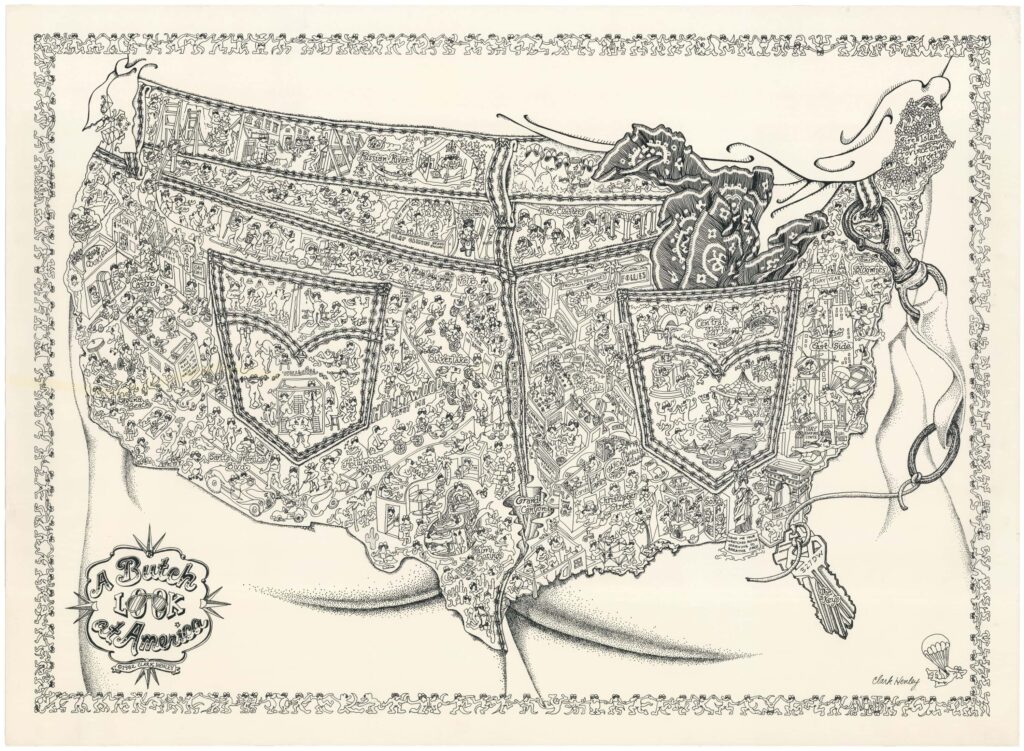
THE BUTCH MANUAL: WEST COAST LAUNCH 7pm, Green Apple Books on the Park at 9th Avenue, SF, also live-streamed, RSVP here.


